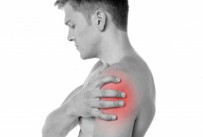Pain: it’s all in your head

Pain: it’s all in your head
Paul Kochoa, PT, DPT, OCS, CGFI
Pain… all of us know what it is. My patients usually come in to see me because of some kind of pain. But what if I said that all your pain is in your head?
Pain is individualized, it’s influenced by society and by our interactions with other people. The United States makes up 4% of the world’s population, but consumes 80% of its opioids. Meaning we, as a society, use more painkillers than any other country in the world. How we understand and treat pain is different than any other country. Many times we perseverate on pain, so much so that our brains become more defensive and more attentive to noxious stimuli and sometimes even interpret non-noxious stimuli as pain.
Pain is basically a chemical reaction in the body. When a nerve gets stimulated by something, our brain receives the signal and then has to interpret it. It’s an OUTPUT signal, not an INPUT signal. It’s a matter of context. If we’re having a bad day, are depressed, or are dealing with other co-morbidities or have past emotional experiences, then we are more likely to listen and hear the pain and pay more attention to it.
Pain is a complex subject that sometimes cannot be measured or quantified adequately. We do TRY and quantify it, but we have so much more to learn about it. Pain is a threat to the body, we pay attention to it only if it’s a big threat. For example, if we stub our toe walking in our living room at home we pay attention to it, but if we are fighting in a war and running around dodging enemy gunfire, we wouldn’t really pay attention to a stubbed toe or sprained ankle.
Pain is not just due to dysfunctions in the musculoskeletal system, it involves more of the nervous system. Just because you have a herniated disc or spinal stenosis, it doesn’t mean that THAT is the cause of your pain.
Studies show if we can change the psychological aspect of pain, we can reduce the pain sensitivity and thereby, the intensity. We can work only in the physical realm, give you exercises or modalities that are proven to work, but if we don’t encourage the patient or enable them to be proactive with their own program, we won’t get anywhere.
Half of the battle lies with the patient. If you, as a patient, believe that you can get better, then WE can get you better. Understanding pain is important. It is different than tissue damage. It’s a sensory event in the brain. The degree of pain you have is not related to the degree of tissue injury or damage you have. It’s not a diagnosis, it’s not a result of an MRI or an X-ray… It’s how we deal with it.
If you would like more information, please call Professional Physical Therapy and Training at 973-270-7417. Our offices are located within the YMCA locations in Madison and Summit, NJ. You do not need to be a member of the YMCA to visit with us.
Image courtesy of stockimages / FreeDigitalPhotos.net
